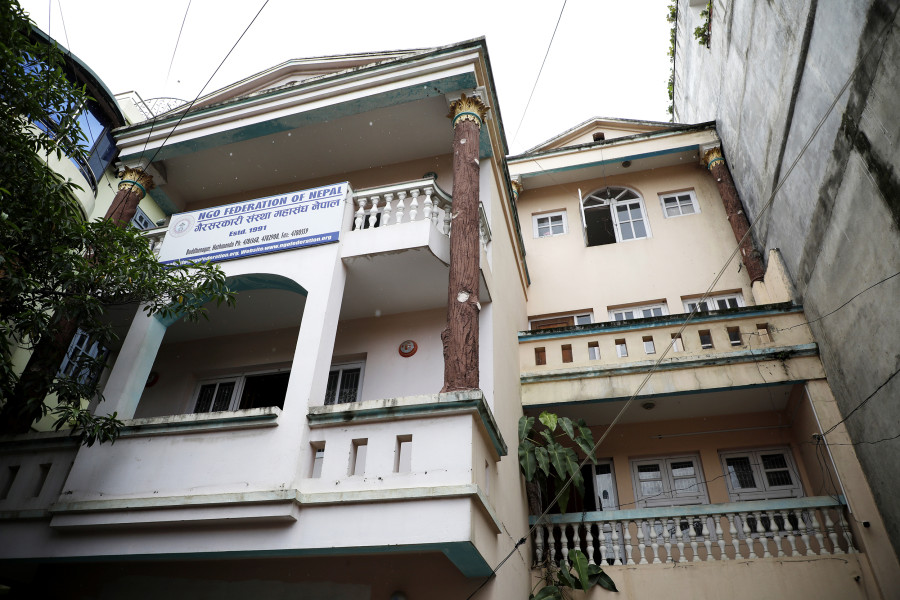National
With new legislation in the works, Nepal’s civil society organisations fear tighter control
The KP Sharma Oli administration has been repeatedly criticised by national and international rights bodies for trying to curb dissent through laws and policies.
Bhrikuti Rai
In his 14 years as an NGO worker, Gobinda Bahadur Shahi had gotten used to governmental red tape around running development nonprofits. As the director of the Karnali Integrated Rural Development and Research Centre, which works in Karnali’s seven districts, he had been chugging along just fine, making sure the administrative work didn’t get in the way of his actual work.
But in the last two years, the sudden increase in procedural hurdles has made things even more difficult, he says. Something as simple and regular like the renewal process for NGOs has become taxing, with local authorities imposing arbitrary restrictions, like getting project approvals and recommendations from all the wards and municipalities they work in as well as from the Finance Ministry.
For Shahi’s Karnali Centre, which runs multiple cross-cutting projects from education to health across Karnali province, this means collecting documents from the over 70 wards where they work.
“Even when we submitted all the required documents, as per the guidelines, like we have in the past, the chief district officer in Jumla asked us for additional paperwork for our renewal,” said Shahi. “When we questioned her, she said she just needed it, without elaborating.”
Shahi was eventually able to get the renewal, but unlike in the past, when the process would get done in about two weeks, it took more than two months. And this has already happened to them twice.
“In the last two years, we’ve been spending more time and resources running around for administrative work, which hampers our core work in the district,” he said.
Shahi isn’t alone. The government’s increasingly tighter control of Nepal’s NGO and INGO space is leading to criticism at home and abroad.
Last week, Human Rights Watch said that the Nepal government is restricting social organisations through legislation. It raised concerns over a Cabinet decision to authorise the Ministry of Home Affairs to prepare a draft of a new law to regulate and supervise social organisations.
Human Rights Watch has asked the Nepal government to not undermine the fundamental rights of citizens to organise and stop treating activists, including critics, as threats.
These were the exact sentiments brewing at a dialogue event in Kathmandu on Thursday, where Shahi, along with dozens of representatives from NGOs and INGOs, had gathered to relay their frustration and anger to government bureaucrats. They repeatedly said that the government should be able to provide clarity on what civil society organisations can and cannot do, and only then can they move forward accordingly.
“Why is the government suddenly so negative towards civil society organisations? We are not a threat to the government,” one participant said impassionately. “The way NGOs face humiliation is just unacceptable.”
Participants at the event pointed especially to the government’s tough stance towards rights organisations, compared to those who have more “hardware” components in their projects—physical infrastructure to show—which aligns with the current government’s “prosperity and development” rhetoric.
“The government cannot dictate NGOs to work in the areas of their priority, and treat the money we’ve raised for our work as their own,” said another participant.
They also criticised the government’s decision to not hold consultations with civil society organisations while drafting the new law on social organisations. Last month, the Cabinet authorised the Home Ministry to draft laws on social organisations, instead of the Ministry of Women, Children and Senior Citizens, which is the designated agency to draft policies, laws, standards and regulations for non-government organisations. This has unsettled many.
“The details of the bill have been shrouded in secrecy,” said Shiva Paudel of the Association of INGOs in Nepal. “It will be too late for us to provide recommendations by the time it reaches the parliamentary committee.”
In October, the Cabinet rejected the Ministry of Women, Children and Senior Citizens’ proposal to draft regulations for non-governmental and social organisations, arguing that the Home Ministry had already been given approval to draft the new law.
Earlier, both ministries were working independently on draft laws on social organisations, but the Home Ministry got the Cabinet approval first.
The fear among civil society organisations in Nepal also stems from the government’s efforts last year targeting the NGO sector.
The government’s National Integrity Policy 2018 had courted controversy for aiming at tighter controls over non-governmental space. The proposed policy had provisions requiring INGOs to take approval from the Finance Ministry for their annual programmes, including funding. It also barred INGOs from sending reports about Nepal to countries where their headquarters are located without the government’s permission.
These actions, along with related legislation, have jolted civil society organisations into action. They’ve been pushing for advocacy and trying to engage with the government at all levels, especially in the drafting stages of the regulations for non-government and social organisations, said Reshma Shrestha, programme coordinator at the Association of INGOs in Nepal.
In the last eight months, members of the association have met everyone from ministers to the prime minister’s advisers and members of the National Planning Commission hoping to open dialogues with stakeholders about the proposed legislation. But there hasn’t been much progress.
“We’ve heard the bill will be presented in Parliament next month, and only then will we have a chance to see what the provisions are,” said Shrestha.
Representatives from the Home Ministry, the Law Commission and the Kathmandu Chief District Office have attempted to placate concerned voices, saying they are open to discussions and consultations.
Bashista Kumar Ghimire, under-secretary at the Ministry of Home Affairs, defended the government’s decision to not disclose details of the proposed law, saying it wasn’t yet in its final stage and that the ministry had only changed a few things in the regulations after consulting with experts.
“We saw what happened to the Guthi bill and the government is very much aware of the need to involve civil society groups in the drafting process,” he said at Thursday’s dialogue event. “There are several layers to this and we are willing to talk.”
Addressing concerns regarding procedural obstacles, government bureaucrats in the room said that they were only doing their job.
“The government is trying to regulate this sector because we clearly see a need to change the old rules. It’s just like parents watching over their children, nothing more,” said Krishna Bahadur Katuwal, deputy chief district officer of Kathmandu. “We are not competitors. We are only trying to seek transparency and accountability from these organisations.”
This is not the first time that human rights organisations have raised concerns about growing threats to civil liberties in Nepal.
Earlier this year, a report by the New Zealand-based Human Rights Measurement Initiative, said, “Nepal’s Empowerment score of 5.6, based on a detailed survey of human rights experts, tells us that many people in Nepal are not enjoying their civil rights and political freedoms.” The empowerment category in the report includes right to assembly and association, right to opinion and expression, and the right to participate in government.




 14.24°C Kathmandu
14.24°C Kathmandu















